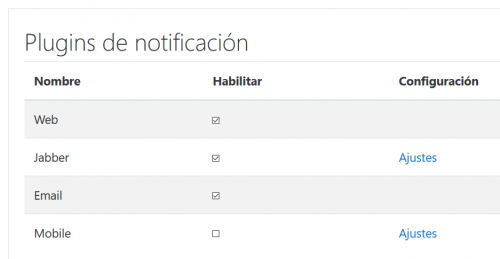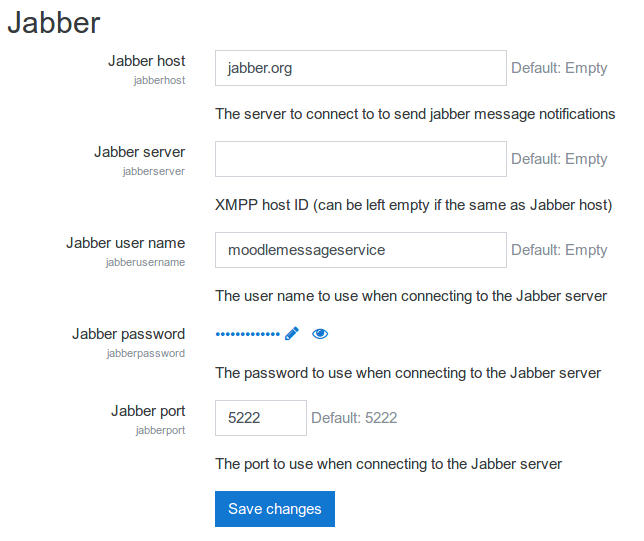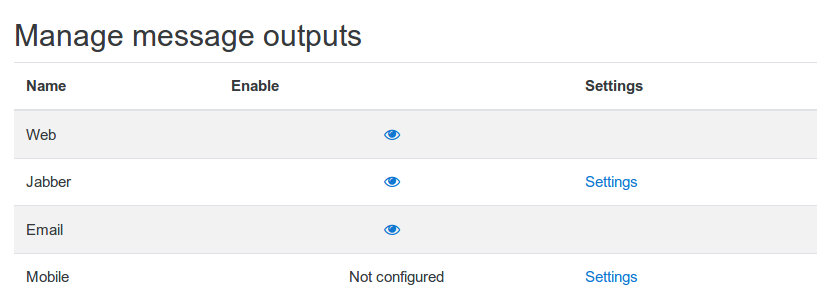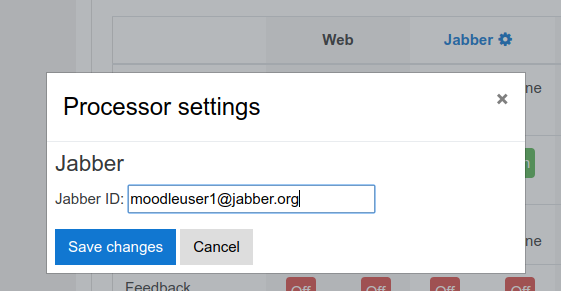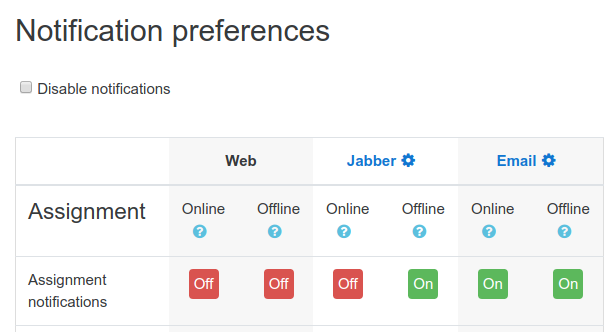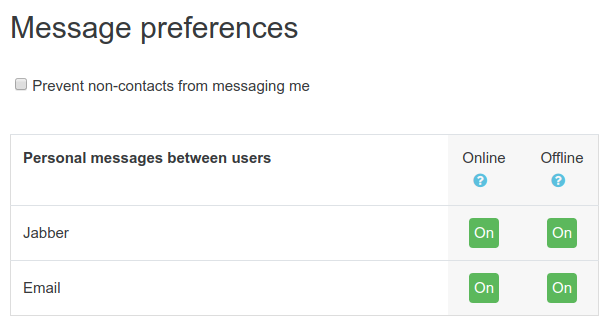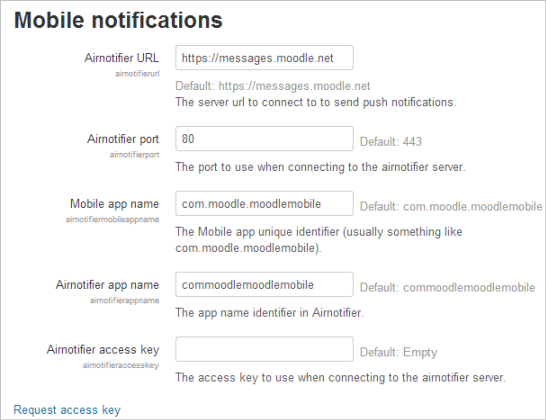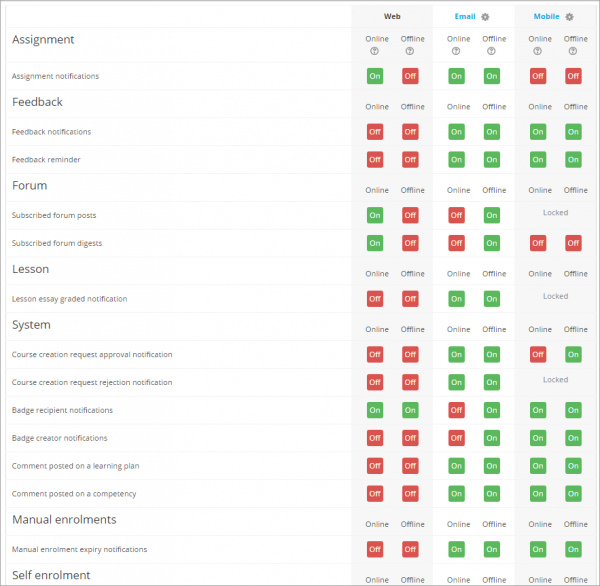Configuraciones de mensajería
Configuraciones de mensajería para todos los usuarios
- Los usuarios pueden decidir como desean ser notificados sobre nuevos mensajes y notificaciones de eventos al editar su página de preferencias de mensajería, a la cual pueden acceder desde, ya sea el enlace hacia Preferencias en el menú del usuario, o desde el ícono del engrane en los menúes de mensajería/notificaciones. Vea Mensajería y Notificaciones para más información.
- Cuales opciones vean allí depende de lo que se haya habilitado por el administrador. Por ejemplo, la opción de móvil mobile solamente está disponible si el sitio está habilitado para la App mobile.
Habilitar / deshabilitar mensajería para todo el sitio
El sistema de mensajería personal en Moodle está habilitado por defecto. Puede ser deshabilitado por un administrador del sitio desde 'Características avanzadas' en la Administración del sitio.
¡Nueva característica
en Moodle 3.6!
Desde 'Características avanzadas', el administrador puede "Permitir mensajería para todo el sitio" (deshabilitada por defecto). Si esta configuración es habilitada, los usuarios en el sitio pueden ver a todos los usuarios cuando seleccionen alguien a quien mandarle mensaje y pueden elegir aceptar mensajes provenientes de quienquiera en el sitio.
Configuraciones de notificación
Las configuraciones predeterminadas del sistema de mensajería son configuradas en 'Configuraciones de notificación' en la Administración del sitio / Mensajería
Hay cuatro tipos predeterminados de plugins de notificación: web, Jabber, email y mobile.
Por defecto, tanto web y Email están ambos habilitados, aunque Email solamente funcionará si el sitio ha sido configurado apropiadamente para proporcionar Email. Las notificaciones Jabber y Mobile están desactivadas por defecto y necesitan ser configurados primeramente.
Jabber
Jabber is the original name of the Extensible Messaging and Presence Protocol (XMPP), an open standard instant messaging protocol. The Jabber service on the Moodle server must be configured before use. To configure Jabber, an XMPP account should be created that is specific to the Moodle server, either on a locally hosted XMPP server or on one of many public servers. The information for this account is entered in Site administration / Plugins / Message outputs / Jabber:
- Host - The server to connect to to send jabber message notifications - this is entered as the full hostname (e.g. jabber.org) with no protocol (i.e. no "https://")
- Server - XMPP host ID (can be left empty if the same as Jabber host)
- Username - The user name to use when connecting to the Jabber server as the Moodle site, without domain name
- Password - The password to use when connecting to the Jabber server as the Moodle site.
- Port - defaults to 5222
After the Jabber service has been configured, it must also be enabled:
Each Moodle user wishing to receive instant message notifications through Jabber must create an account on a Jabber server and must configure their Moodle account to include those details:
The user must also choose which notifications to receive using Jabber:
Users may also choose to receive Moodle messages via Jabber:
Notificaciones Mobile
The administrator can configure the site to push messages to mobile devices. Moodle pushes messages to a messaging server, which then pushes it to Apple or Google depending on the platform the target device is using (iOS or Android).
Los sitios registrados can make use of the default messaging server https://messages.moodle.net/ which is maintained by moodle.com. To connect to this, click 'Request access key' and then add it to the Airnotifier access key field.
Alternatively, you may install your own private Airnotifier server and use that instead. See https://github.com/dongsheng/airnotifier for details.
Salidas de mensaje por defecto
You can specify the default outputs for each type of message that Moodle can send in 'Default message outputs' in Site administration.
You can also set to what degree each type of message is enabled, and whether users are able to change these default settings in their profiles:
- Disallowed - This particular type of message is not allowed at all and users will not see any settings related to them. Message of the chosen type will never be delivered.
- Permitted - Users are permitted or allowed to change the settings. When the user account is created, the new user will inherit the settings the administrator sets here, but will be allowed to change them afterward in their Messaging settings. Messages will be delivered as the user sets them on their own Messaging settings page.
- Locked - Users are not permitted or allowed to change these settings. When the user account is created, the new user will inherit the settings the administrator sets here and will never be allowed to change them. Messages will be delivered for all users as you set them on this page.
Ingresado/Fuera-de-línea
You can set whether each of these will be sent when the user is online through the messaging system interface available to users in their profiles, and/or whether each output is sent via email.
Ordenamiento de configuraciones de mensajería
Because users might have many different messaging options, they are ordered into different components - for example, activities, system, enrolments etc.
Lista de tipos de mensaje
Except for Personal messages between users, which refers to the interaction messaging tool on a user profile, the other messages are generated by events in Moodle. These are set in the system by the Administrator in Site administration > Plugins > Message outputs > Default message outputs.
| Output Name | Description | Recipients |
|---|---|---|
| Assignment notifications | Student has submitted an tarea | Teacher |
| Warning when your quiz attempt becomes overdue | See Configuraciones del examen | Student |
| Available update notifications | Notice of new releases of Moodle code | Site administrators |
| Backup notifications | Automated backup schedule run completed | Site administrators |
| Badge creator notifications | Notify creator of a badge when it is awarded to someone | Any badge creator (typically Teacher or Manager role) |
| Badge recipient notifications | Notify recipient of a badge when it is awarded to them | Any badge recipient (typically Student role) |
| Comment posted on a learning plan | ? | ? |
| Comment posted on a competency | ? | ? |
| Confirmation of your own quiz submissions | Notice your quiz was successfully submitted | Student |
| Course creation request approval notification | Notice a requested course has been approved | Defined in Site admin > Courses > Course request > Course request notification |
| Course creation request notification | Notice a course has been requested - See Solicitud de curso | Defined in Site admin > Courses > Course request > Course request notification |
| Course creation request rejection notification | Notice a requested course has been rejected | Defined in Site admin > Courses > Course request > Course request notification |
| Subscribed forum digests | Sets default for this for user profiles | Authenticated users |
| Important errors with the site | Important errors - See also Depuración | Site administrators |
| Manual enrolment expiry notifications | Notice if Inscripción manual about to expire | Manual enrolees |
| Self enrolment expiry notifications | Notify users when their enrolment expires | Enroller only, or Enroller & Enrolled user |
| Lesson essay graded notification | Notify students a teacher has graded a Lesson essay question | Student |
| Personal messages between users | Using the Messaging interface tool | Authenticated Users |
| Message to confirm that an inbound message came from you | See Configuración del correo | Authenticated Users |
| Feedback reminder | Retroalimentación non-respondent reminder message | Student feedback activity non-responders |
| Warning when an inbound message could not be processed | See Configuración del correo | Authenticated Users |
| Confirmation that a message was successfully processed | See Configuración del correo | Authenticated Users |
| Notices about minor problems | Site administrators | |
| Notification of rule subscriptions | Notifications from Monitoreo de evento rules | Event rule subscribers |
| Subscribed forum posts | Default for forum subscription handling | Anyone subscribed to a forum |
| Feedback notifications | Notices from setting Enable notification of submissions | Teacher, Feedback administrator |
| Notification of quiz submissions | Message that student has submitted a quiz | Teacher |
Roles y capacidades de Mensajería
The following capabilities can be applied as permissions to make custom changes to roles affecting messaging.
- course:bulkmessaging - Send a message to many people
- site:readallmessages - Read all messages on site
- site:sendmessage - Send messages to any user
- user:editownmessageprofile - Edit own user messaging profile
- user:editmessageprofile - Edit user messaging profile
All email messages and notifications go to the email address set in a user's profile. The administrator can optionally allow users to choose to have notifications sent to a different email address. This is off by default and can be enabled in Site administration > Advanced features > Notification email override.
Users can then enter their alternative email address under Preferences/User account/Notification preferences: Click on the gear icon next to "Email" in the table header and enter the alternative email.
Note: The 'messagingallowemailoverride' setting does not affect failed log in notifications as they do not go through the messaging system, and will therefore still go to the original email specified.
